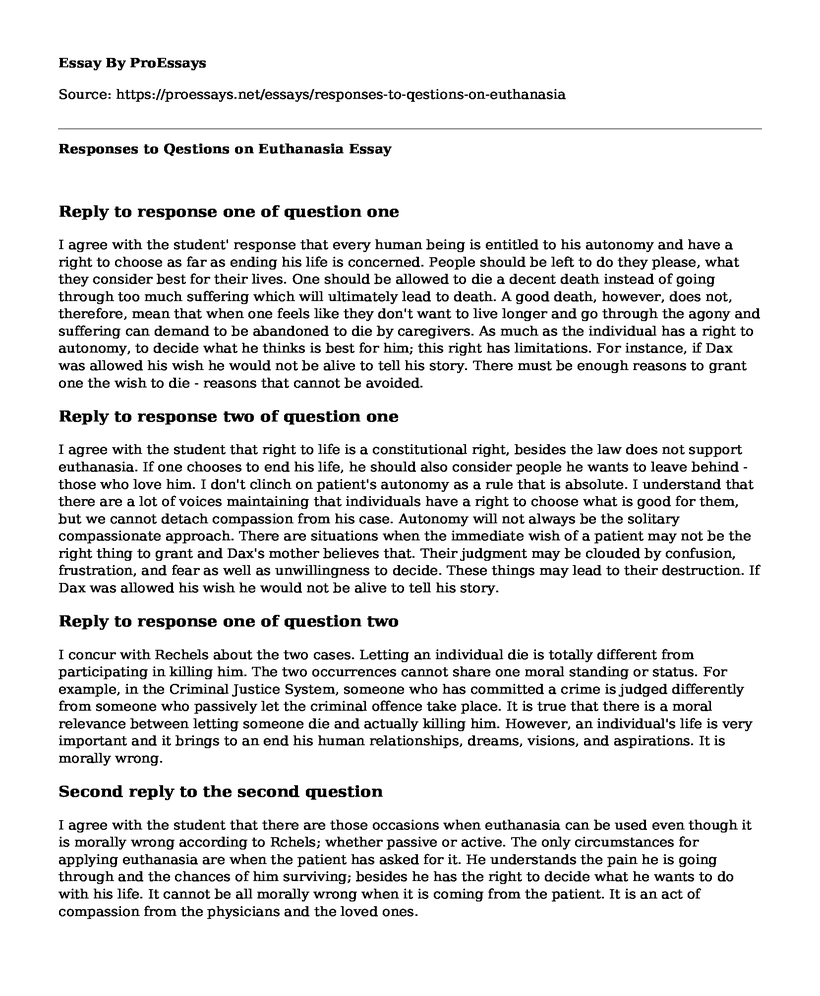Reply to response one of question one
I agree with the student' response that every human being is entitled to his autonomy and have a right to choose as far as ending his life is concerned. People should be left to do they please, what they consider best for their lives. One should be allowed to die a decent death instead of going through too much suffering which will ultimately lead to death. A good death, however, does not, therefore, mean that when one feels like they don't want to live longer and go through the agony and suffering can demand to be abandoned to die by caregivers. As much as the individual has a right to autonomy, to decide what he thinks is best for him; this right has limitations. For instance, if Dax was allowed his wish he would not be alive to tell his story. There must be enough reasons to grant one the wish to die - reasons that cannot be avoided.
Reply to response two of question one
I agree with the student that right to life is a constitutional right, besides the law does not support euthanasia. If one chooses to end his life, he should also consider people he wants to leave behind - those who love him. I don't clinch on patient's autonomy as a rule that is absolute. I understand that there are a lot of voices maintaining that individuals have a right to choose what is good for them, but we cannot detach compassion from his case. Autonomy will not always be the solitary compassionate approach. There are situations when the immediate wish of a patient may not be the right thing to grant and Dax's mother believes that. Their judgment may be clouded by confusion, frustration, and fear as well as unwillingness to decide. These things may lead to their destruction. If Dax was allowed his wish he would not be alive to tell his story.
Reply to response one of question two
I concur with Rechels about the two cases. Letting an individual die is totally different from participating in killing him. The two occurrences cannot share one moral standing or status. For example, in the Criminal Justice System, someone who has committed a crime is judged differently from someone who passively let the criminal offence take place. It is true that there is a moral relevance between letting someone die and actually killing him. However, an individual's life is very important and it brings to an end his human relationships, dreams, visions, and aspirations. It is morally wrong.
Second reply to the second question
I agree with the student that there are those occasions when euthanasia can be used even though it is morally wrong according to Rchels; whether passive or active. The only circumstances for applying euthanasia are when the patient has asked for it. He understands the pain he is going through and the chances of him surviving; besides he has the right to decide what he wants to do with his life. It cannot be all morally wrong when it is coming from the patient. It is an act of compassion from the physicians and the loved ones.
Cite this page
Responses to Qestions on Euthanasia. (2022, May 09). Retrieved from https://proessays.net/essays/responses-to-qestions-on-euthanasia
If you are the original author of this essay and no longer wish to have it published on the ProEssays website, please click below to request its removal:
- Leader Theory and Biblical Worldview - Essay Example
- Paper Example on Undocumented Immigration and Healthcare
- Research Paper on Change Management and Cultural Web
- Essay Sample on DNA Assessment
- Essay Example on Leadership: Motivating and Organizing People for Progression
- Michigan's Successful Strategy to Reduce Recidivism and Prison Populations - Essay Sample
- Paper Example on Six Sigma: Making Better Management Decisions in Marketing & Sales







